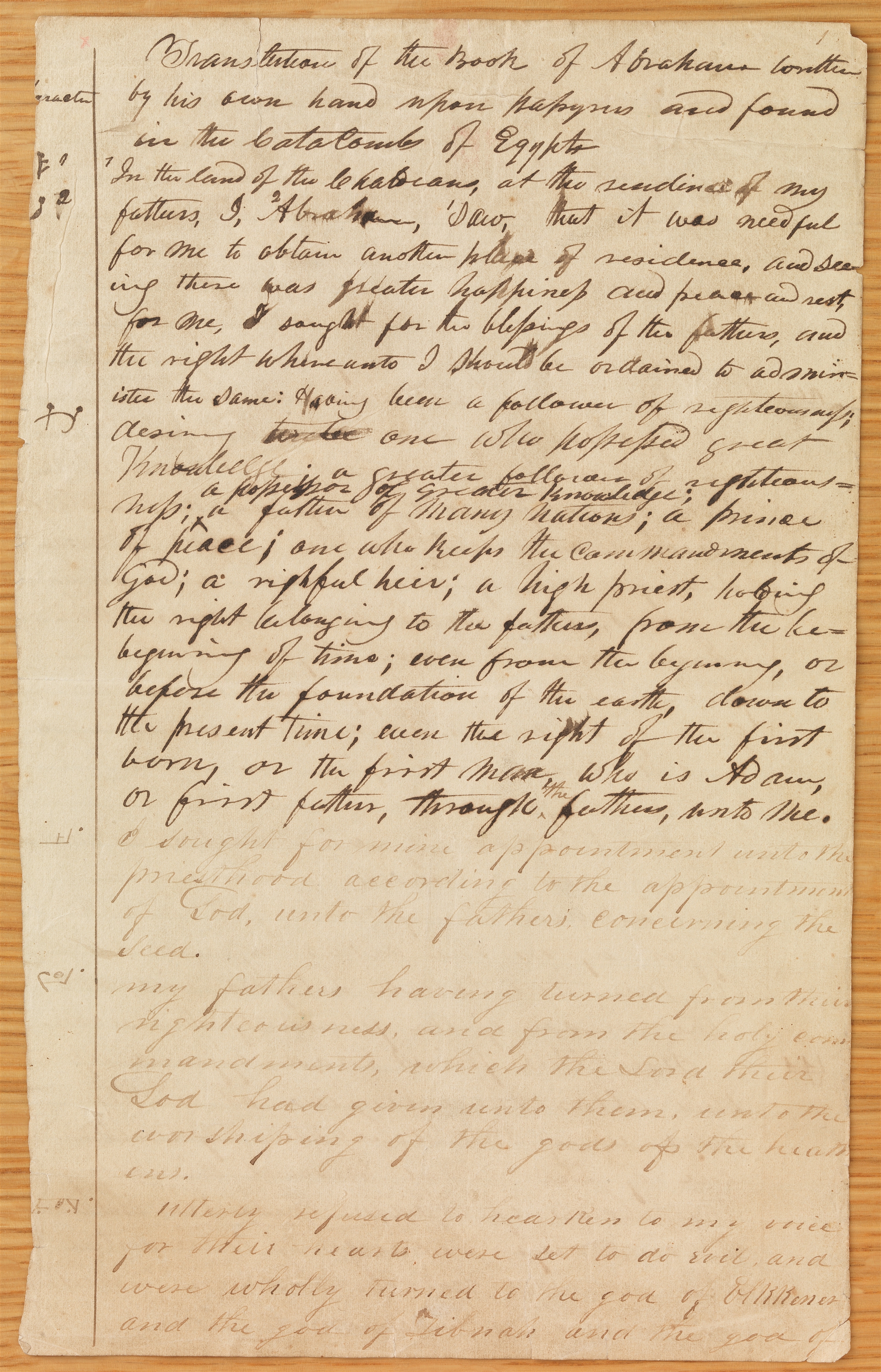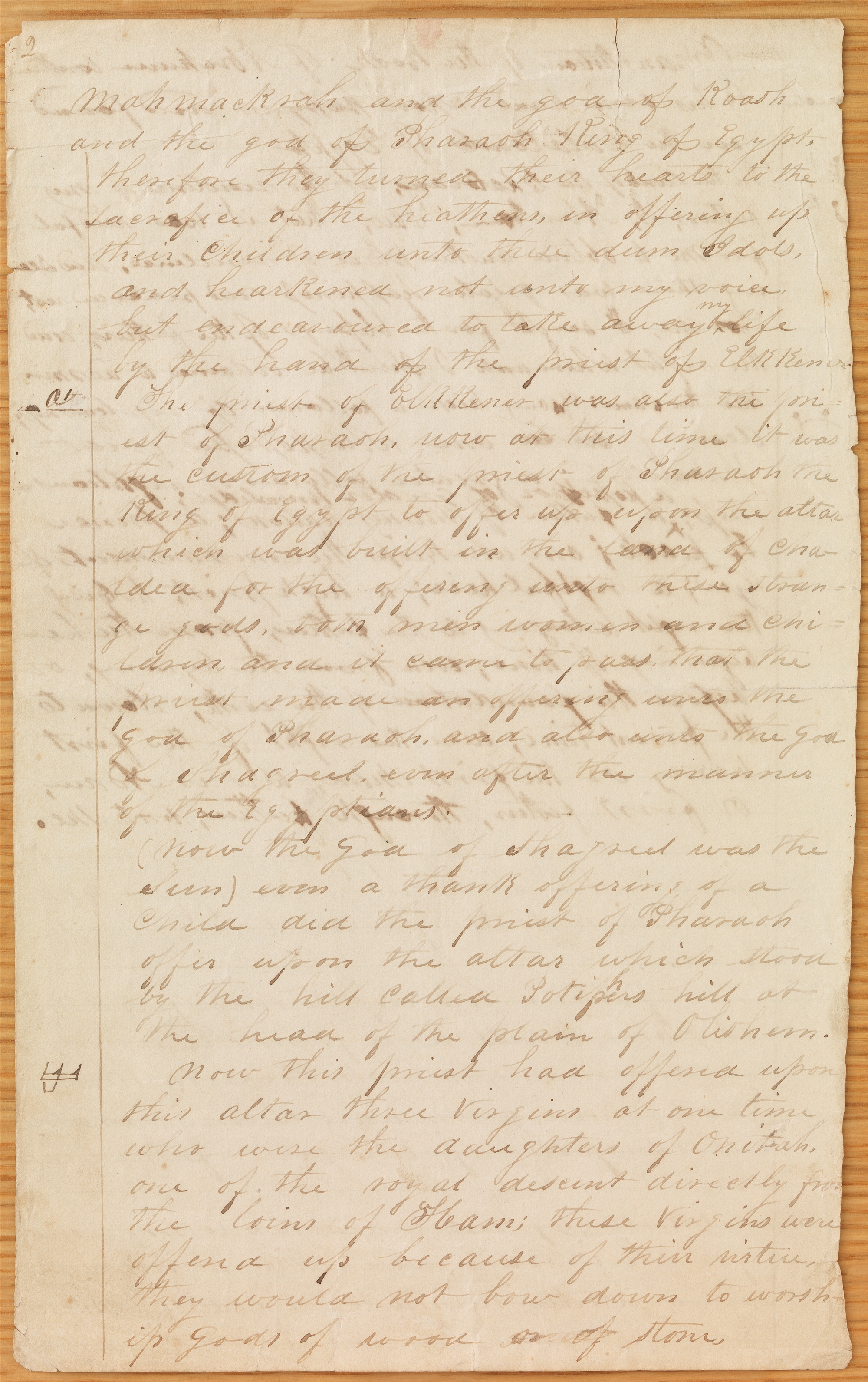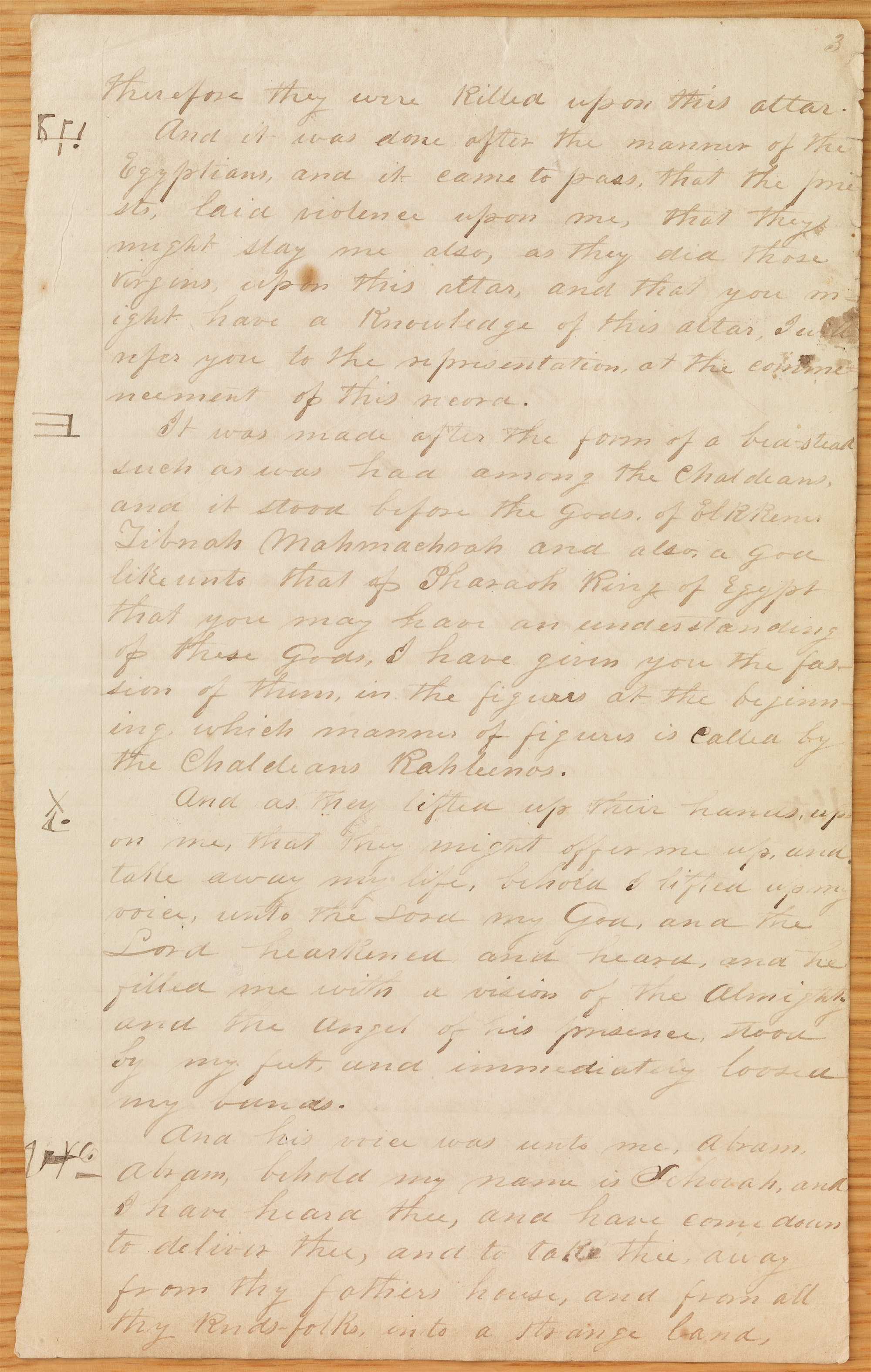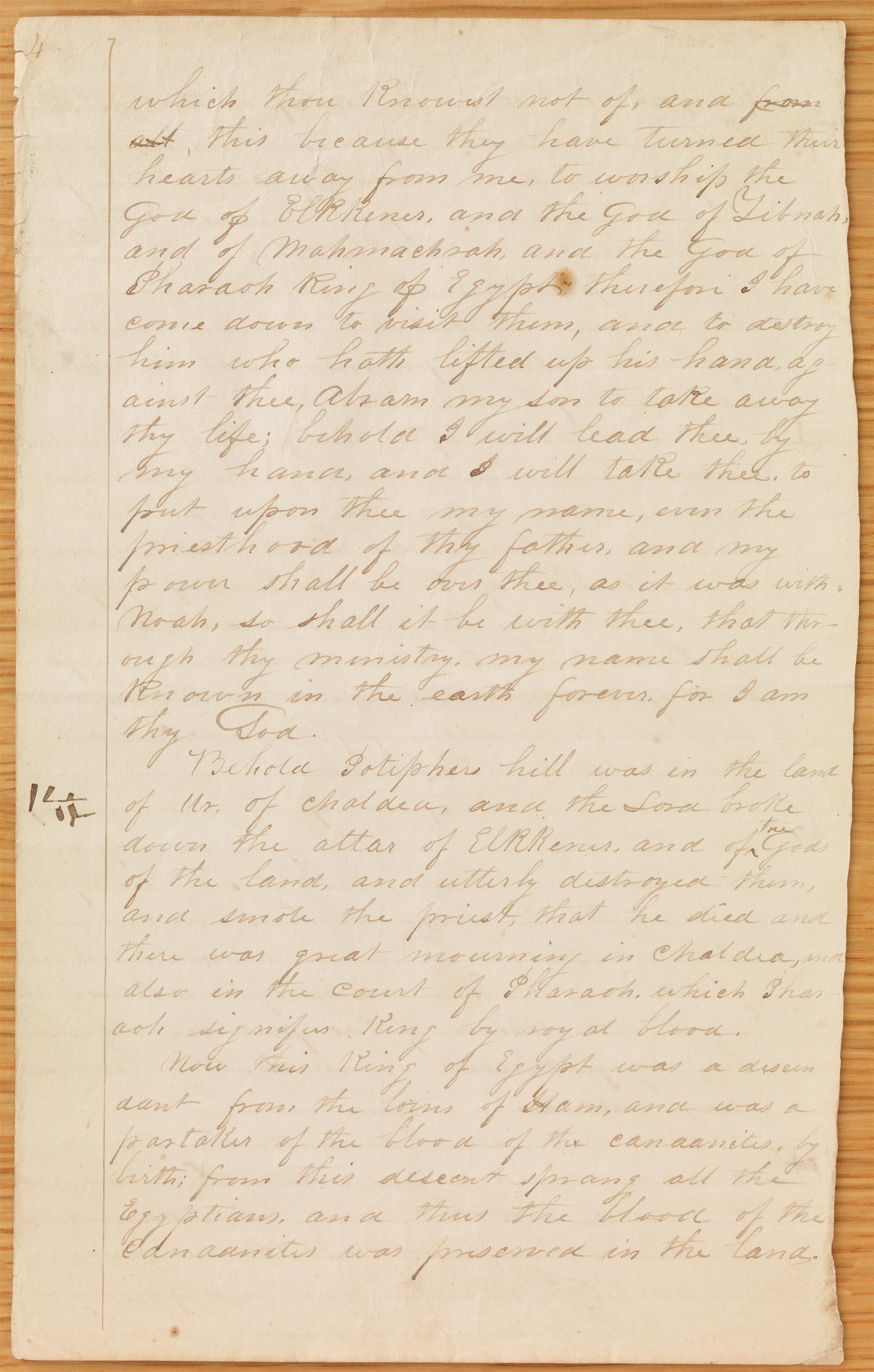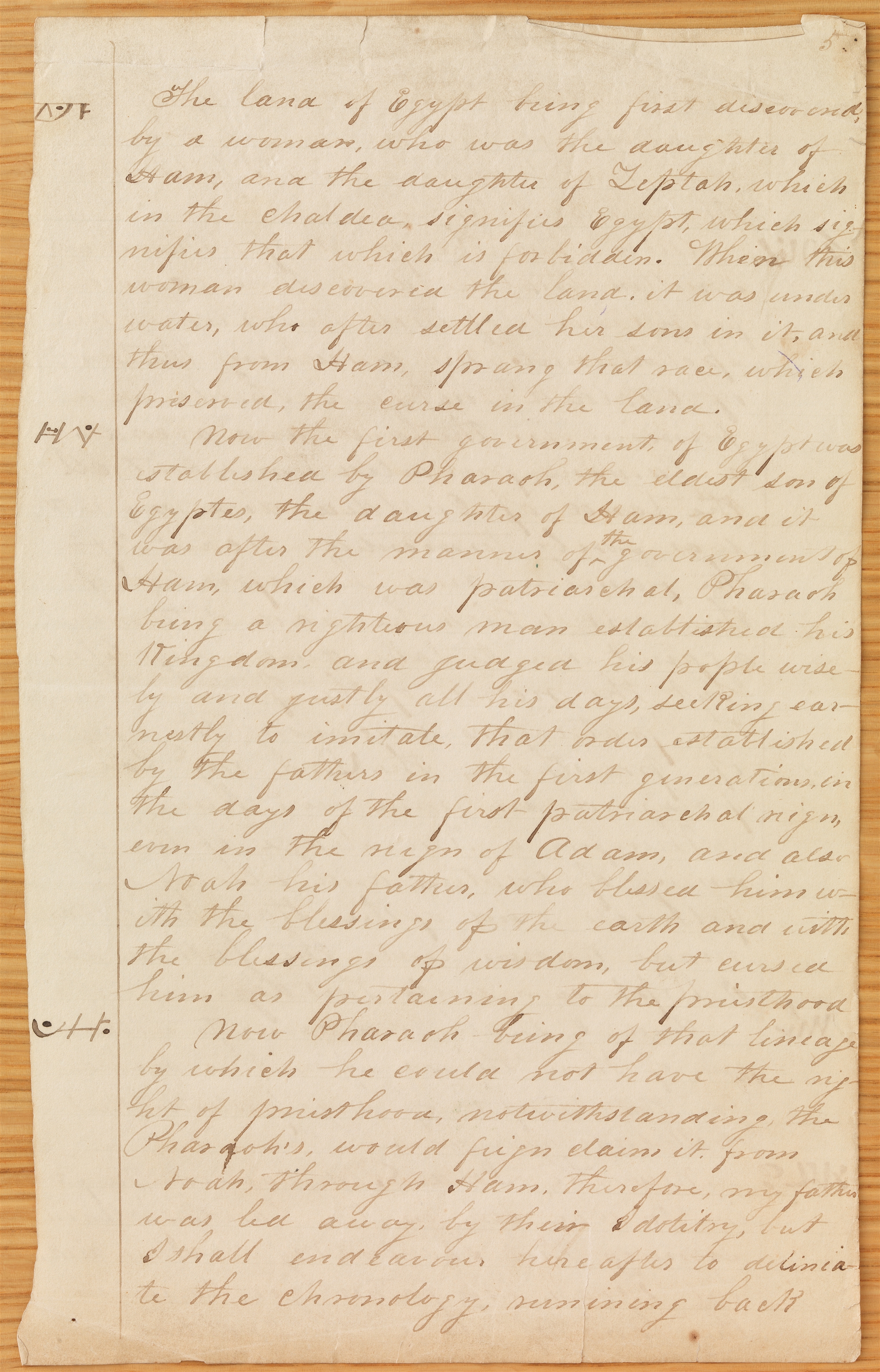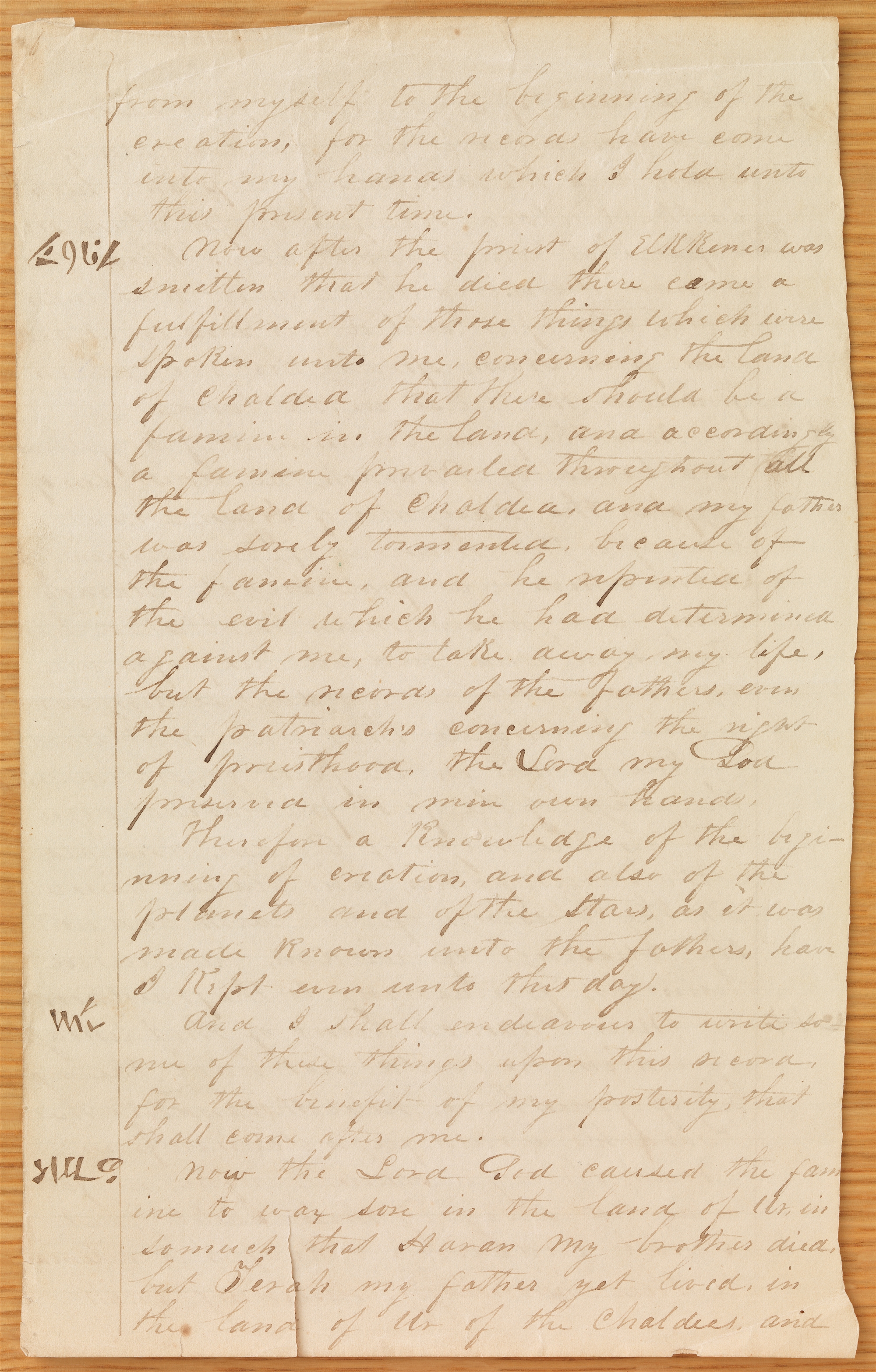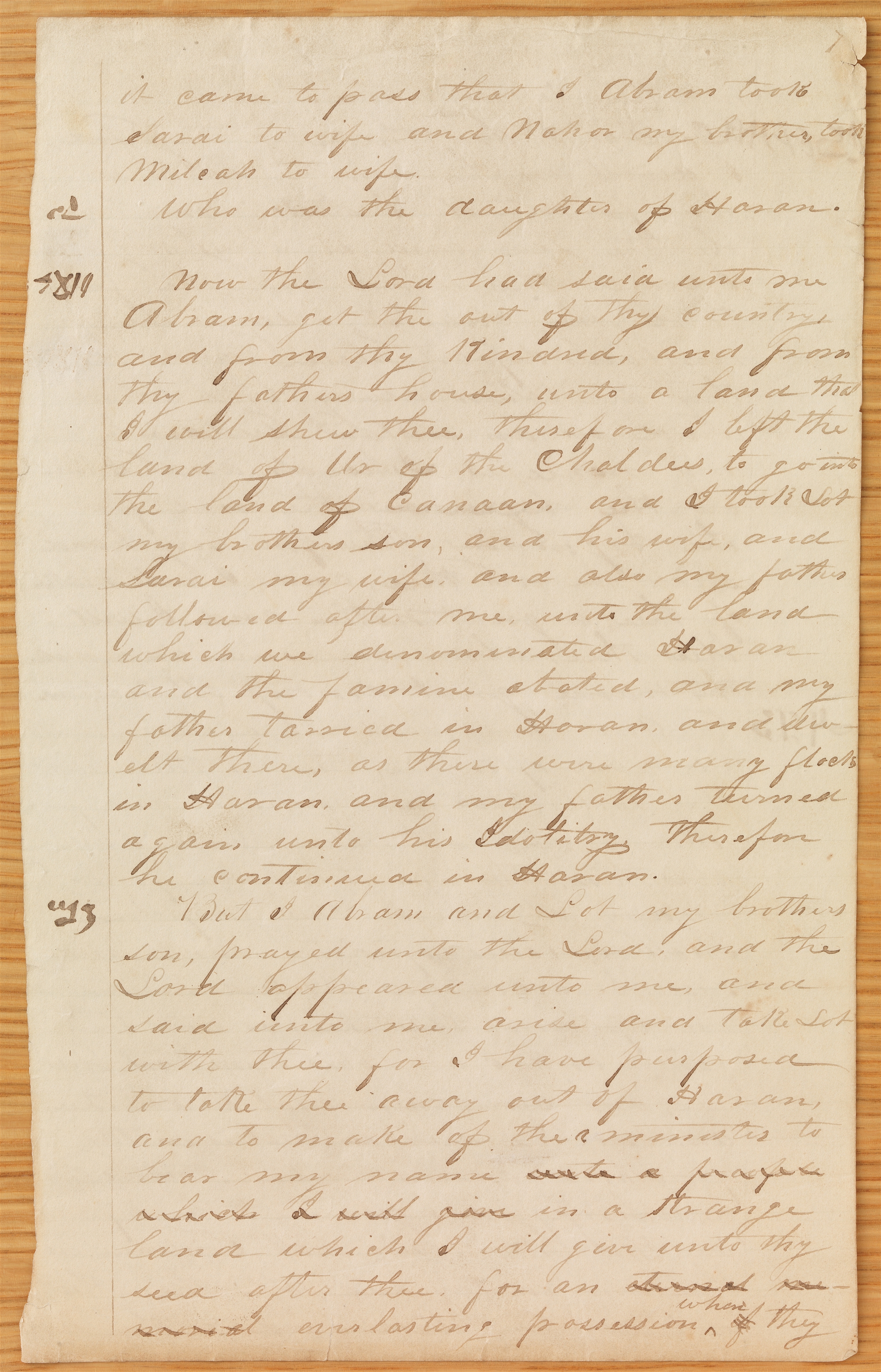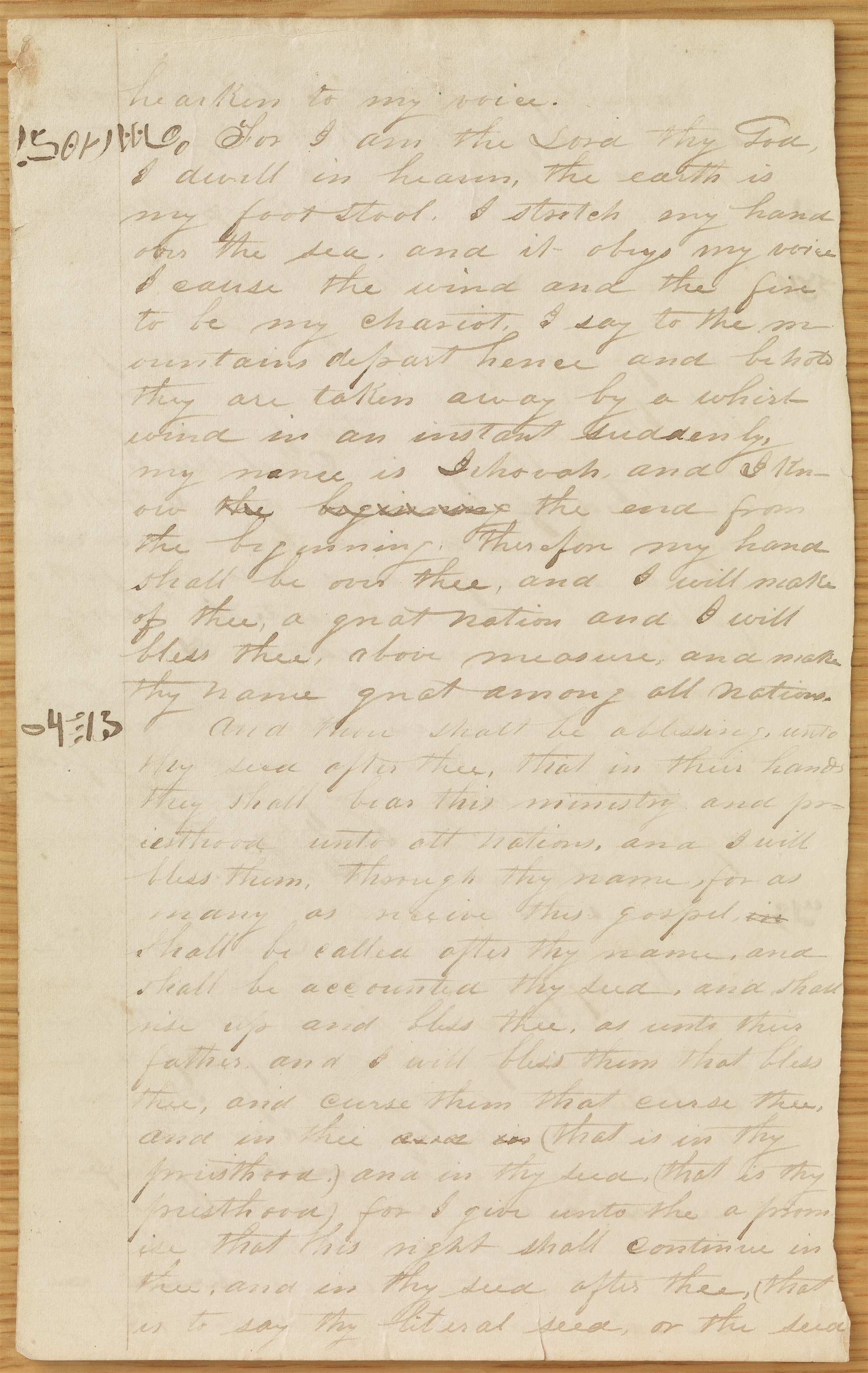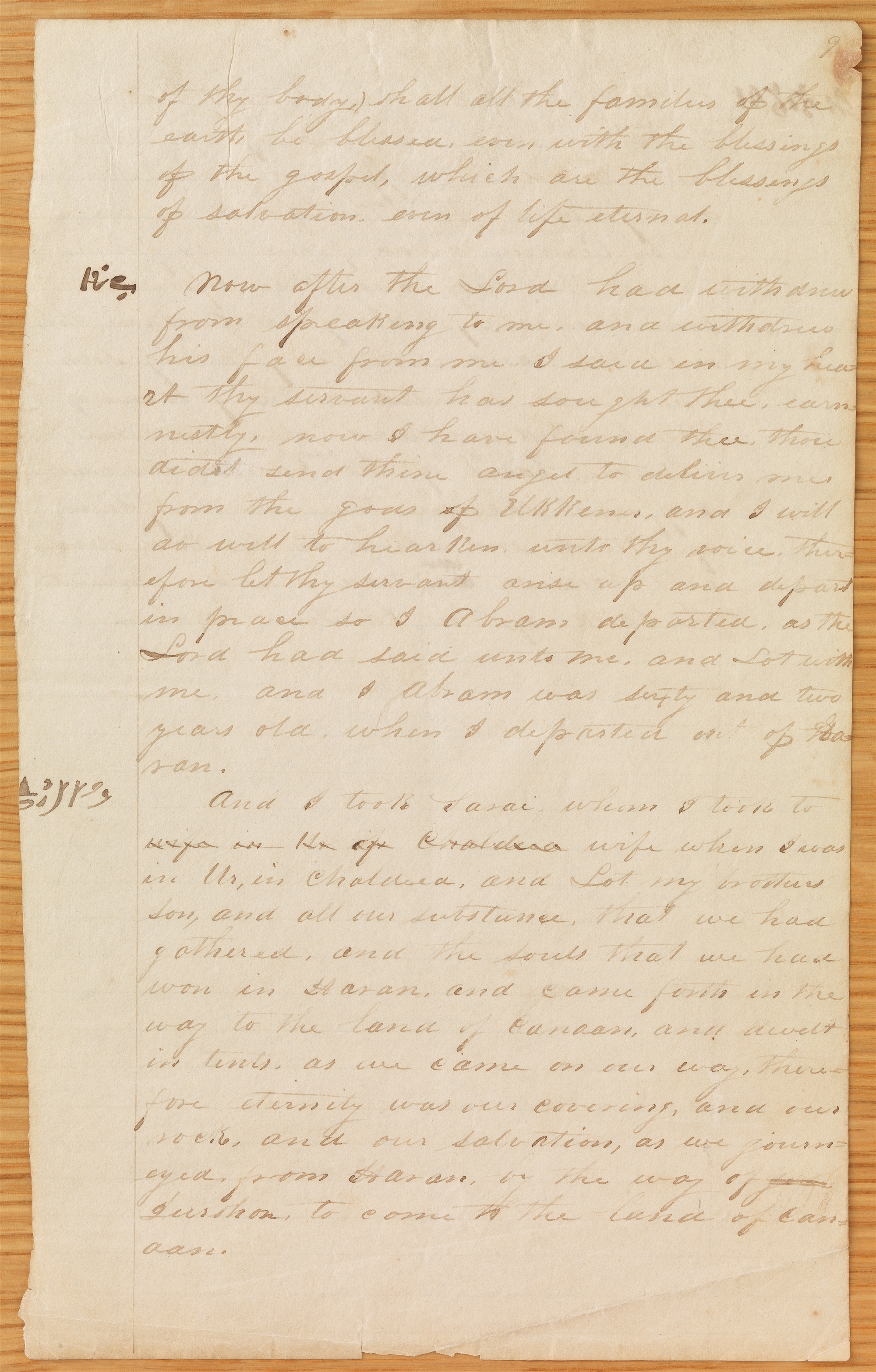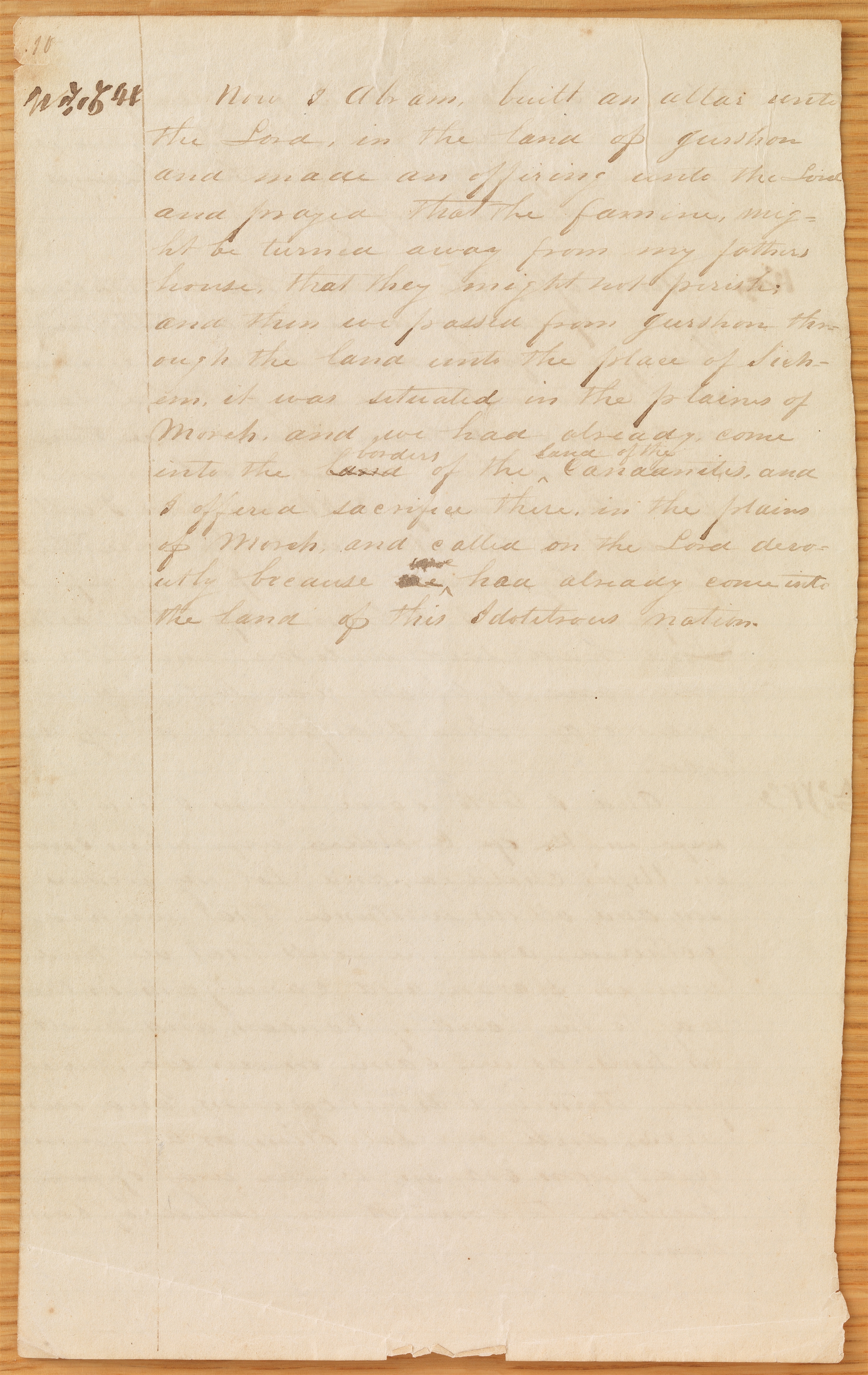Transcript of BOA Manuscript–C [Abraham 1:1–2:18], dated circa July–November 1835.
- Type
- Manuscript
- Hearsay
- Scribed VerbatimDirectTranslation
- Reference
Book of Abraham Manuscript, circa July–circa November 1835–C [Abraham 1:1–2:18], The Joseph Smith Papers website, accessed September 23, 2021
- Audience
- N/A
- Transcription
Translation of the Book of Abraham written
by his own hand upon papyrus and found in the CataCombs of Egypt
s1In the land of the Chaldeans, at the residince of my fathers, I,
2Abraham, 1saw, that it was needful for me to obtain another place of residence, and seeing there was greater happiness and peace and rest, for me, I sought for the blessings of the fathers, and the right whereunto I should be ordained to administer the same: Having been a follower of righteousness;
desiring
one◊igh to be one who possessed great Knowledge; a greater follower of righteousness; <a possessor of greater Knowledge;> a father of many nations; a prince of peace; one who keeps the commandments of God; a righful heir; a high priest, holding the right belonging to the fathers, from the bebegining of time; even from the begining, or before the foundation of the earth, down to the present time; even the right of the first born, or the first man, who is Adam, or first father, through <the> fathers, unto me.I sought for mine appointment unto the priesthood according to the appointment of God, unto the fathers, concerning the Seed.
my fathers having turned from their righteousness, and from the holy commandments, which the Lord their God had given unto them, unto the worshiping of the gods of the heathens.
utterly refused to hearken to my voice for their hearts were set to do evil, and were wholly turned to the god of Elkkener and the god of Zibnah and the god of Mahmackrah and the god of Koash and the god of Pharaoh King of Egypt, therefore they turned their hearts to the sacrafice of the heathens, in offering up their Children unto these dum Idols, and hearkened not unto my voice, but endeavoured to take away <my> life by the hand of the priest of Elkkener.
The priest of Elkkener was also the priest of Pharaoh, now at this time it was the custom of the priest of Pharaoh the King of Egypt to offer up upon the altar which was built in the land of chaldea for the offering unto these strange gods, both men women and children, and it came to pass, that the priest made an offering unto the god of Pharaoh, and also unto the god of Shagreel, even after the manner of the Egyptians.
(now the god of Shagreel was the Sun) even a thank offering of a child did the priest of Pharaoh offer upon the altar which stood by the hill called Potip<h>ers hill at the head of the plain of Olishem. now this priest had offered upon this altar three Virgins at one time who were the daughters of Onitah, one of the royal descent directly fro[m] the loins of Ham; these Virgins were offered up because of their virtue, they would not bow down to worship gods of wood
an◊or of stone, therefore they were killed upon this altar.And it was done after the manner of the Egyptians, and it came to pass, that the priests, laid violence upon me, that they might slay me also, as they did those Virgins, upon this altar, and that you might have a knowledge of this altar, I will refer you to the representation, at the commencement of this record. It was made after the form of a bed-stead such as was had among the Chaldeans, and it stood before the gods, of Elkkener. Zibnah Mahmachrah and also, a god like unto that of Pharaoh King of Egypt that you may have an understanding of these gods, I have given you the fassion of them, in the figures at the beginning, which manner of figures is called by the Chaldeans Kahleenos.
And as they lifted up their hands, upon me, that they might offer me up, and take away my life, behold I lifted up my voice, unto the Lord my God, and the Lord hearkened, and heard, and he filled me with a vision of the Almighty and the Angel of his presence, stood by my feet, and immediately loosed my bands.
And his voice was unto me, Abram, Abram, behold my name is Jehovah, and I have heard thee, and have come down to deliver thee, and to take thee, away from thy fathers house, and from all thy k[i]nds-folks, into a strange land, which thou knowest not of, and
from allthis because they have turned their hearts away from me, to worship the god of Elkkener, and the god of Zibnah, and of Mahmachrah, and the god of Pharaoh King of Egypt; therefore I have come down to visit them, and to destroy him who hath lifted up his hand, against thee, Abram my son to take away thy life; behold I will lead thee, by my hand, and I will take thee, to put upon thee my name, even the priesthood of thy father, and my power shall be over thee, as it was with Noah, so shall it be with thee, that through thy ministry, my name shall be known in the earth forever, for I am thy God.Behold Potiphers hill was in the land of Ur, of chaldea, and the Lord broke down the altar of Elkkener, and of <the> gods of the land, and utterly destroyed them, and smote the priest, that he died and there was great mourning in chaldea, <and> also in the court of Pharaoh. which Pharaoh signifies King by royal blood.
Now this King of Egypt was a descendant from the loins of Ham, and was a partaker of the blood of the canaanites. by birth; from this descent sprang all the Egyptians, and thus the blood of the canaanites was preserved in the land.
The land of Egypt being first discovered, by a woman, who was the daughter of Ham, and the daughter of Zeptah, which in the chaldea, signifies Egypt, which signifies that which is forbidden.
WhichWhen this woman discovered the land. it was under water, who after settled her sons in it, and thus from Ham, sprang that race, whichpreserved, the curse in the land.
Now the first government, of Egypt was established by Pharaoh, the eldest son of Egyptes, the daughter of Ham, and it was after the manner of <the>
government of Ham, which was patriarchal, Pharaoh being a righteous man established his Kingdom, and judged his p[e]ople wisely and justly all his days, seeking earnestly to imitate, that order established by the fathers in the first generations, in the days of the first patriarchal reign, even in the reign of Adam, and also Noah his father, who blessed him with the blessings of the earth and with the blessings of wisdom, but cursed him as pertaining to the priesthood
Now Pharaoh being of that lineage by which he could not have the right of priesthood, notwithstanding, the Pharaoh’s, would feign claim it. from Noah, through Ham, therefore, my father was led away, by
therrtheir Idolitry, but I shall endeavour hereafter to deliniate the chronology, runining back from myself to the beginning of the creation, for the records have come into my hands which I hold unto this present time.Now after the priest of Elkkener was smitten that he died there came a fulfillment of those things which were spoken unto me, concerning the land of Chaldea that there should be a famine in the land, and accordingly a famine prevailed throughout
theall the land of Chaldea, and my father was sorely tormented, because of the famine, and he repented of the evil which he had determined against me, to take away my life, but the records of the fathers, even the patriarch’s concerning the right of priesthood, the Lord my God preserved in mine own hands,Therefore a Knowledge of the beginning of creation, and also of the planets and of the Stars, as it was made known unto the fathers, have I Kept even unto this day.
And I shall endeavour to write some of these things upon this record, for the benefit of my posterity, that shall come after me.
Now the Lord God caused the famine to wax sore in the land of Ur, insomuch that Haran my brother died, but Terah my father yet lived, in the land of Ur of the Chaldees, and it came to pass that I Abram took Sarai to wife and Nahor my brother, took Milcah to wife.
who was the daughter of Haran.
Now the Lord had said unto me Abram, get the[e] out of thy country,
and from thy Kindred, and from thy fathers house, unto a land that I will shew thee, therefore I left the land of Ur of the Chaldees, to go into the land of Canaan, and I took Lot my brothers son, and his wife, and Sarai my wife, and also my father followed after me, unto the land which we denominated Haran and the famine abated, and my father tarried in Haran, and dwelt there, as there were many flocks in Haran, and my father turned again unto his Idolitry, therefore he continued in Haran.
But I Abram and Lot my brothers son, prayed unto the Lord, and the Lord appeared unto me, and said unto me, arise and take Lot with thee, for I have purposed to take thee away out of Haran, and to make of the[e] <a> minister to bear my name
unto a people which I will givein a Strange land which I will give unto thy seed after thee, for aneternal memorialeverlasting possession <when>ifthey hearken to my voice.For I am the Lord thy God, I dwell in heaven, the earth is my footstool. I stretch my hand over the sea, and it obeys my voice I cause the wind and the fire to be my chariot, I say to the m ountains depart hence and behold they are taken away by a whirlwind in an instant suddenly, my name is Jehovah, and I know
the beginningthe end from the beginning, therefore my hand shall be over thee, and I will make of thee, a great nation and I will bless thee, above measure, and make thy name great among all nations.And thou shalt be a blessing, unto thy seed after thee, that in their hands they shall bear this ministry and priesthood unto all nations, and I will bless them, through thy name, for as many as receive this gospel,
inShall be called after thy name, and shall be accounted thy seed, and shall rise up and bless thee, as unto their father, and I will bless them that bless thee, and curse them that curse thee, and in theeand in(that is in thy priesthood.) and in thy seed, (that is thy pristhood) for I give unto the[e] a promise that this right shall continue in thee, and in thy seed after thee, (that is to say thy literal seed, or the seed of thy body,) shall all the families of the earth be blessed, even with the blessings of the gospel, which are the blessings of salvation, even of life eternal.Now after the Lord had withdrew from speaking to me, and withdrew his face from me, I said in my hea rt thy servant has sought thee, earnnestly, now I have found thee, thou didst send thine angel to delivr me, from the gods of Elkkener, and I will do well to hearken, unto thy voice, therefore let thy servant arise up and depart in peace so I Abram departed, as the Lord had said unto me, and Lot with me, and I Abram was sixty and two years old, when I departed out of Haran.
And I took Sarai, whom I took to
wife in Ur in of Chaldeeawife when I was in Ur, in Chaldeea, and Lot my brothers Son, angd all our substance, that we had gathered, and the souls that we had won in Haran, and came forth in the way to the land of Canaan, and dwelt in tents, as we came on our way, therefore eternity was our covering, and our rock, and our salvation, as we journeyed, from Haran, by the way ofjershJurshon, to comethto the land of canaan.Now I Abram, built an altar unto the Lord, in the land of Jurshon and made an offiring unto the Lord and prayed that the famine, might be turned away from my fathers house, that they might not perish; and then we passed from Jurshon through the land unto the place of Sichem, it was situated in the plains of Moreh, and we had already, come into the
land<borders> of the <land of the> Canaanites, and I offered sacrifice there, in the plains of Moreh, and called on the Lord devoutly because◊e ◊e<we> had already come into the land of this Idolitrous nation.- Citations in Mormonr Qnas
The B. H. Roberts Foundation is not owned by, operated by, or affiliated with the Church of Jesus Christ of Latter-day Saints.

